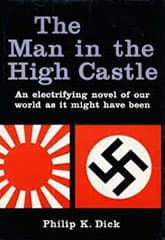The Man in the High Castle
Critique • Quotes • At the movies
 First edition
First editionFirst publication
1962
Literary form
Novel
Genres
Science fiction, alternative history
Writing language
English
Author's country
United States
Length
Approx. 90,000 words
Who really won World War II?
Around the time of this novel, Philip K. Dick was being heralded as the next scifi writer to break into mainstream popularity after Kurt Vonnegut. The Man in the High Castle won the prestigious Hugo Award for science fiction and Dick seemed to be on the way. But somehow he remained during his lifetime a cult favourite rather than becoming a crowd-pleaser.
Perhaps this, his "break-through novel", shows why.
It's an alternative history: What if the Nazis and the Japanese won the Second World War? Well, this idea may seem to have been done to death in speculative fiction. But, note, Dick is the author credited with pioneering this particular concept. And he takes it further and more creatively into other realms than any one else. He's also a better writer.
He starts with the United States being divided between German and Japanese occupation. Then, where other writers would focus on political suppression and a rebel movement, Dick follows odd characters who consult the mystical teachings of the I Ching and have bizarre experiences that culminate in a startling discovery about the real nature of the society.
Apparently Dick himself consulted the I Ching to select some plot developments. Even if you don't believe in the mystical crap about the I Ching, this method is interesting for adding an element of randomness to the work, similarly to how some 1960s recording artists threw bits of tape into the air to be reassembled haphazardly into new musical forms. It was a experimental decade.
Hypothetical universes
I won't give away the surprise twists in The Man in the High Castle but they turn this into a what-if story inside a what-if story. Possibly within yet another hypothetical universe. A classic Dick conceptual maze.
Even more alienating for the general public, this strange, dark tale never really reaches a conclusion to satisfy the masses.
This is also one of Dick's most acclaimed novels, but far from my favourite. It's not that I want a more conventional storyline. Quite the opposite. Knowing how truly twisted and exciting later Dick novels become, I find this one too straightforward!
It seems a compromise between what was expected of Dick then and what Dick would later become—as a writer and a thinker.
It was a crazy, exciting, new idea in 1962 to present a story undercutting the reality of the Second World War's outcome less than two decades after the actual war. Now of course alternative histories have taken this and other periods as subject matter many times—it's a whole subgenre of speculative fiction—so we don't shudder with quite the same frisson that its first readers must have felt back then.
Still, if you are new to Philip K. Dick, it's a good jumping off point. It's also worthwhile to read this relatively short novel before getting into the much more involved television series that began in 2015 and takes place in the alternative reality Dick created, but expanding into some different directions.
So hold onto your reading hat. As wild as this tale may seem, the ride gets much bumpier in the years ahead with Dick's increasingly bizarre and fascinating writing.
— Eric
Critique • Quotes • At the movies

